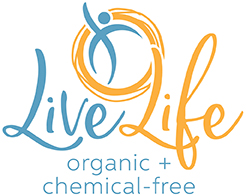Do you have food allergies?
I used to have SO.many. food allergies (the non-life threatening kind). Traditional allergy testing would turn my back fire-engine red.
Fruits and vegetables were the primary cause. Or, so I thought.
Today, I can eat nearly all fruits and vegetables. As long as they’re organic.
My body was doing its job, protecting me from harmful chemicals such as pesticides. In the process it associated food with chemical and attacked both.
It took time to undo this association.
When I started re-introducing foods and eating 100% organic, I felt much better. I stopped having allergic reactions to strawberries, blueberries, lettuce, spinach, carrots and nearly all other produce.
What a relief that was.
I had more food options at parties and restaurants. My mouth was free of itchyness and stomach was free of discomfort when I ate. I started to really enjoy eating food again.
Can people be allergic to pesticides?
Allergies are different from a chemical sensitivity, medically speaking. It’s important to draw a distinction between the two since the body is reacting in different ways. People that have a food allergy may also have a chemical sensitivity.
In some instances, both allergies and chemical sensitivities may be caused by chemicals in our food supply. Even small amounts of chemicals in our food supply.
“A specific pesticide exposure which might cause an allergic reaction
in a susceptible individual can be 1,000 times less than an
exposure which would cause a toxic reaction.”[1]
– Medical University of South Carolina
How many foods have pesticides in them?
Next time you grocery shop, look around and notice the number of foods labeled “organic”. And the number of foods that are not.
You’ll quickly find that our standard grocery stores are filled with foods that are grown with pesticides.
They’re in our breakfast oatmeal, lunch sandwiches, dinner veggies. Pesticides in our juice, coffee, tea.
Take a look in your fridge and cabinets. How many foods are labeled organic?
Did you feel your stomach turn with the realization that you could be eating more organic foods?
Take that feeling and commit to yourself that you’re going to make a sustainable lifestyle change. The kind that lasts beyond next week, next month, next year.
How to go “entirely organic” and pesticide-free with your food.
How do you easily change your entire food stock to being pesticide-free?
One step at a time.
Sustainable change, the kind that lasts for a lifetime, requires steps. Consistency. Early wins. Overcoming of small challenges. Here are a few tips to follow:
- Replenish the foods you buy each week with organic.
For most of us, that’s the fruits and veggies. Since they have a shorter shelf life than packaged food, these are the items we typically use or replace first. Hopefully before they mold in our refrigerators.
Frozen organic fruits and veggies are easy to spot. All you have to look for is the USDA Organic logo. Super easy.
Fresh fruits and veggies may or may not have the USDA Organic logo; however, they’re typically labeled “organic” somewhere on the sticker or signage. For example, apples typically have a sicker but lettuce might have signage above indicating organic.
- Buy non-GMO.
Food labeled as “organic” is automatically non-GMO (Genetically Modified Organisms). Score!
GMO means that the seed genetics has been altered in a laboratory to create a product that does not naturally grow in nature and that is not created thorough traditional cross-breeding methods.[2]
Food made in a lab… stick to the food that Mother Nature produces.
Increase the number of organic foods you buy each week. Do this until your cart is full of organic, non-GMO foods.
- Be consistent in buying organic.
Once you buy organic beans, keep buyin
g organic beans. It’s easier to get in the habit of buying organic and building your organic food supply that way.
- Forgive yourself.
No need to beat yourself up for slow progress or “falling off the organic wagon.” It happens to everyone. Just smile and hop back on the organic wagon.
- Find food you love.
Part of choosing organic, like with any new food brand, is finding products that are organic and meet your expectations for texture and taste. Since most organic food tastes so much better, it’s pretty easy to find an organic brand that you’ll like.
- HAVE FUN doing it!
Make it a game and challenge yourself (and your family too!) to find organic food deals, brands, foods. Get connected with organic food companies. These guys can be real champions for organic food, people’s health, and the environment.
Conclusion
Food allergies (non-life threatening) and sensitivities may be caused by pesticides in our foods. Some pesticides may cause the body to have an allergic reaction and develop a chemical sensitivity, even at small amounts that are 1,000 times less than what’s considered a “toxic reaction.” Change your eating to all organic and pesticide free. Follow these tips: when food runs out replace it with organic, buy non-GMO, be consistent in buying organic, forgive yourself if you fall off the organic wagon and get back on again, find food you love, and HAVE FUN doing it!
References
[1] http://academicdepartments.musc.edu/family_medicine/oem_agmed/Allergypesticides.htm
[2] https://www.nongmoproject.org/gmo-facts/

